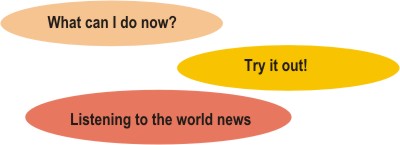|
Education


Do
you ever catch yourself finishing off other people's sentences
before they finish? We do this a lot in our own language as
we can predict what the person is going to say. We may not
know exactly what they are going to say but we usually have
a very good idea.
Predicting
and inferencing
The more you can predict the easier it is for you to understand
meaning. This is true of English as well. You can train yourself
to predict as much as possible in English. You may be surprised
at how much you can predict in English with a little effort.
When we
listen we also make use of inference skills to find information
that is not explicitly given. This includes information about
the speakers, their age, sex, relationships to each other,
where they are, what they feel, etc. How well we can do this
will depend on our knowledge of the subject, the language
and cultural conventions. Don't approach listening in English
with a blank mind when you already use very highly developed
strategies in your own language. Try and take these strategies
over into English by making connections as you listen.
So
what helps us to predict?
There are many things that help us to predict:
*Our knowledge of the topic and the situation
*'Signposts' or 'signals' such as:
'I'm afraid that …' or 'I'm sorry that
…'
These
show that something negative will follow.
*Likewise, if you hear someone say :
There's one point I'd like to make…'
This tells
us that an opinion will follow.
*'Connectors' such as although, on the other hand,
nevertheless and yet
are also important
They show
us that two contrasting ideas are being presented or that
an idea is being introduced which runs against what has been
said or what will be said.
*Sequences
or listings such as firstly, in the first place,
secondly, thirdly, my next point is, next, last/finally
are also useful.
They
show us that what comes next will be key/main
points.
*References
to time relationships are also helpful to listen out for.
Then next previously while after that when
*Intonation
is important too:
e.g. I need some butter, cheese, bread, tomatoes and a cake.
When we
listen to someone presenting a list with a rising intonation
this indicates that more items will follow. When the speaker's
intonation goes down, this means that they are coming to the
end of the list.

The big
advantage with listening to the World News is that it is updated
on the hour, every hour. This means that you have opportunities
to listen again and again to clarify any points you are unclear
about.
It is
important to prepare yourself to listen before listening.
This is useful for building your confidence and training yourself
to predict will also help you to understand more.
Before Listening
*Listen to the news in Bangla
*Look at a newspaper in Bangla
*Look at the headlines in an English newspaper
*Decide on which two stories you are most interested in
*Think What do I know about these stories?
Have these stories been in the news for a while?
How have they been reported?
How have they been progressing?
*Predict what you think will be said about these stories (write
brief notes)
*Read the articles
*Focus on key words (verbs), phrases, and ideas that you will
listen out for.
Listening
*Listen to the news
*Concentrate fully when your story comes on.
*Follow the news items for one or two days then choose a new
news item.
After Listening
*Decide
- How did the news report compare to the newspaper article
and the news in Bangla?
- Were any of the key words or phrases from the newspaper
repeated?
- Did you learn anything new about these news items?
*Summarise by writing your own paragraph about the story you
have listened to. Add to this paragraph as you follow the
story.
*Evaluate How well have I understood?
How could I improve next time I listen?
*Think positively about your achievement. This will help to
improve your self-confidence about listening.
Web
sites to browse
http://www.wrx.zen.co.uk/britnews.htm for British media
http://www.afp.com/english/links/ for media in English
http://www.bbc.co.uk/ listen to the news, read articles and
email your comments on current issues or chat at http://www.bbc.co.uk/communicate/
Try this one too: http://www.bbc.co.uk/worldservice/learningenglish
The Economist www.economist.com, Financial Times www.financialtimes.com,
The Independent www.independent.co.uk, The Guardian www.guardian.co.uk
New Internationalist www.newint.org, New Scientist www.newscientist.com
Listen to the Australian version of the news http://www.abc.net.au/news/
- important for getting used to other English accents.
Copyright
(R) thedailystar.net 2005
|
